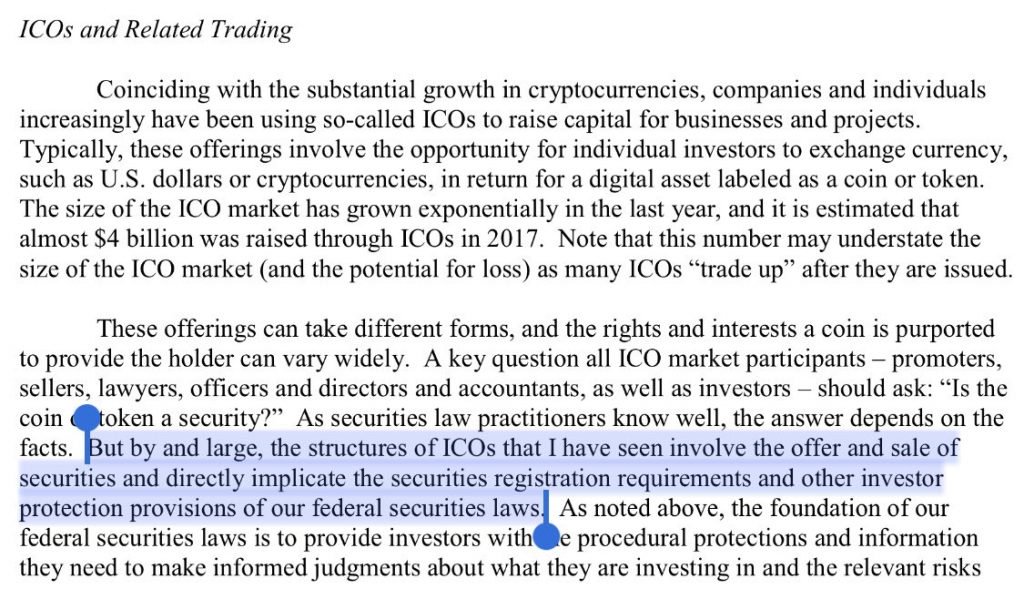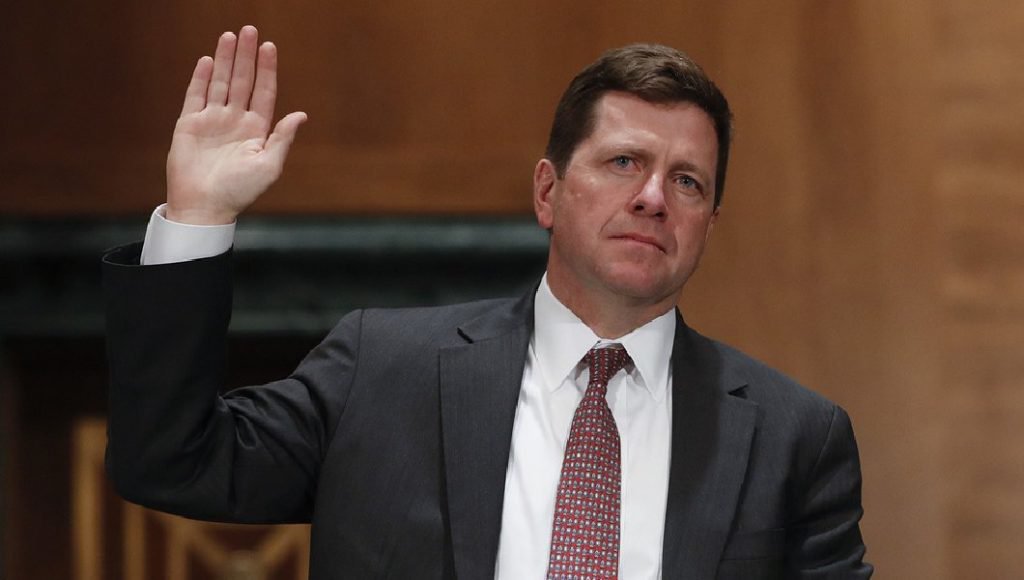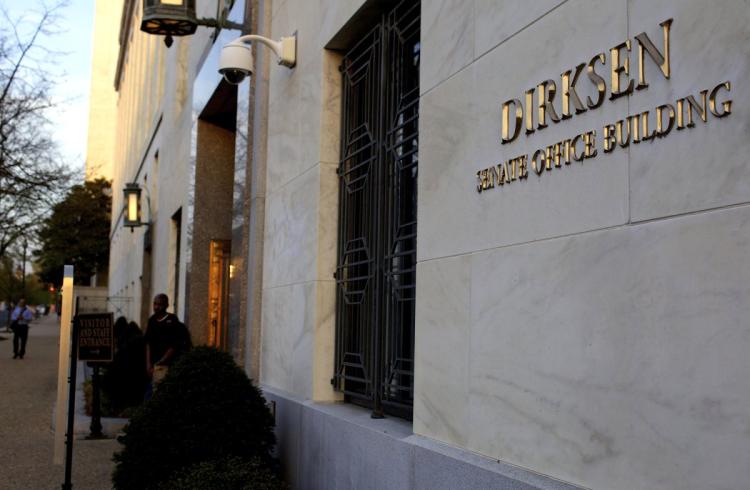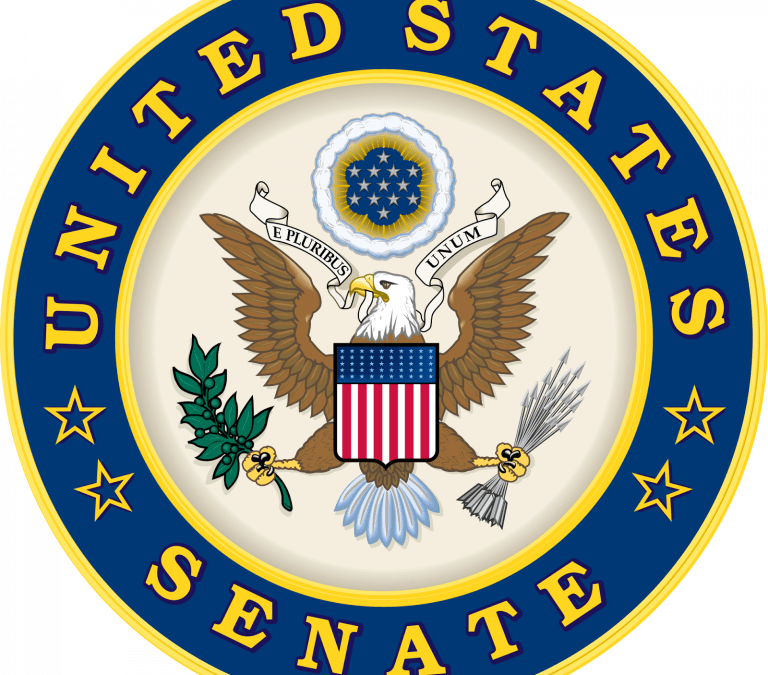A day before a landmark hearing, a day with screaming headlines about the US stock market’s historic dump, not to mention bitcoin’s 65 percent fire sale, the United States Senate released formal testimony of Chairs from the Securities and Exchange Commission (SEC) and Commodity Futures Trading Commission (CFTC). Heads of both entities will testify Tuesday 6 February before the Committee on Banking, Housing, and Urban Affairs to discuss the future of regulating cryptocurrencies. After today, they’re going to have plenty to discuss.
Also read: Market Risk Advisory Committee: Bitcoin Futures Self-Certification Works
Senate Testimony of SEC Chair Clayton
Bitcoiners are looking for any signs of positive news at this point. Set for a 10am Winter hearing Tuesday in the United States Senate Dirksen office building, two of the most powerful regulators in the cryptocurrency space will formally enter their testimony. Titled, Virtual Currencies: The Oversight Role of the U.S. Securities and Exchange Commission and the U.S. Commodity Futures Trading Commission, both Jay Clayton of the SEC and the CFTC’s J. Christopher Giancarlo will face lawmakers who are openly worried about the brave new future of cryptocurrencies such as bitcoin.
This particular committee is chaired by Mike Crapo and ranking member Sherrod Brown, and is made up of 23 members total (12 Republican, 11 Democrat). In the US, each state, of which there are 50, receive 2 Senate seats, making the upper, more deliberative body a pound-for-pound most powerful institution in a nation of more than 325 million people. That a quarter of the Senate gets a chance to weigh in on the topic of bitcoin and cryptocurrency, less than 24 hours after one of its biggest crashes, is bound to make news. It’s also a highly charged political year, as Republicans have a hold on the Senate majority heading into the November off-year elections, and both parties are looking for the slightest vulnerability in the other.

Chairman Jay Clayton of the SEC, 51, was nominated by President Trump over a year ago and assumed office last Summer. The SEC had been largely hands-off in the crypto space, and was notoriously reticent about its supposed role in bitcoin’s mainstreaming. No more. Under Mr. Clayton, the SEC became very active late last year, prosecuting bad actors and making more public statements than in prior years. It has slowed approval of what many believed would be key to the digital asset’s success, bitcoin ETFs.
Chair Clayton’s formal testimony entered into the record of the Senate, and pro-forma released to the public a day prior, is a Rorschach test for readers. Bitcoiners can take away a largely balanced, unsurprising approach from the SEC: the agency feels well entitled to regulate the space where it finds securities, especially when it comes to initial coin offerings and other less tested leveraging mechanisms. “I am particularly concerned,” Mr. Clayton wrote, “about market participants who extend to customers credit in U.S. dollars – a relatively stable asset – to enable the purchase of cryptocurrencies, which, in recent experience, have proven to be a more volatile asset.” But he didn’t put the kibosh on ICOs altogether, insisting, “It is possible to conduct an offer and sales of securities, including an ICO, without triggering the SEC’s registration requirements,” believing “an ICO that is a security can be structured so that it qualifies.”

Leave it to States or Feds?
For those unfamiliar with the US concept of federalism, regulation can, and often is, left to the 50 states to work out under general federal guidelines. Some feel this approach is in line with historic governance of the country, while others appreciate 50 laboratories of different methodologies. It’s a version of subsidiarity, whereby the larger national government allows lawmakers closest to the ground their chance at solving whatever issue particular to regional concerns. On broadening federal law to blanket all crypto assets, the Chair hinted to being “open to exploring with Congress, as well as with our federal and state colleagues, whether increased federal regulation of cryptocurrency trading platforms is necessary or appropriate.” For Wall Street, this could be especially good news, considering their penchant for uniformity and expedience. It’s more difficult to say how bitcoiners will interpret the notion.
Furthermore, the Chair assumes “U.S.-based cryptocurrency trading platforms have elected to be regulated as money-transmission services,” his written remarks revealed, “these predominantly state-regulated payment services have not been subject to direct oversight by the SEC or the CFTC” as of the present hearing. That could be a signal for some kind of hole lawmakers at the federal level might feel the need to fill.

Significantly, the Chair has, especially in previous published comments, wondered aloud about which cryptos fall where on the regulatory scale, and bitcoiners have largely appreciated his awareness of the distinction. In a market where anything is called a cryptocurrency, even a project with only a PDF and no blockchain, the SEC head seems to understand they’re not all equal. There “are cryptocurrencies that, at least as currently designed, promoted and used, do not appear to be securities,” he clarified. Encouragingly, he briefly outlined how “determining what falls within the ambit of a securities offer and sale is a facts-and-circumstances analysis,” noting how “utilizing a principles-based framework…has served American companies and American investors well through periods of innovation and change for over 80 years.” Bitcoiners might be overjoyed to learn the SEC considers crypto possibly one of those “periods of innovation.”
Careful to not come off Panglossian, Mr. Clayton takes into account the very real concerns of lawmakers going forward. However, “These warnings are not an effort to undermine the fostering of innovation through our capital markets – America was built on the ingenuity, vision and spirit of entrepreneurs who tackled old and new problems in new, innovative ways,” he stressed.
The 71 page document has much more to say, and a great deal of it will be brought out through questioning by lawmakers, but, at least for now, bitcoiners can rest easier knowing no imminent Chinese crackdown is coming to the United States. These pages, of course, will have continued coverage of the hearing as it unfolds.
What do you think of the SEC Chair’s testimony? Let us know in the comments section below.
Images courtesy of Pixabay, SEC.
The Bitcoin universe is vast. So is Bitcoin.com. Check our Wiki, where you can learn everything you were afraid to ask. Or read our news coverage to stay up to date on the latest. Or delve into statistics on our helpful tools page.
The post Senate Releases Testimonies Ahead of Crypto Hearing appeared first on Bitcoin News.














